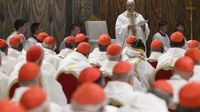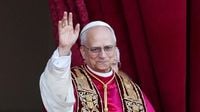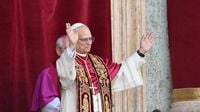On May 10, 2025, Cardinal Robert Francis Prevost was officially named Pope León XIV, marking a historic moment as he becomes the first American pope in the history of the Catholic Church. The announcement came after a swift conclave that concluded in just four votes, showcasing a remarkable consensus among the 133 cardinals present.
Prevost, who is 69 years old, was born in Chicago but has strong ties to Peru and Spain through his family heritage. His mother has Spanish roots, and he has spent significant time in Peru as a missionary with the Augustinians. His election is seen as a continuation of the progressive legacy of his predecessor, Pope Francis, who passed away on April 21, 2025.
During his first appearance as pope, León XIV addressed a crowd of over 150,000 people gathered in St. Peter’s Square, expressing his commitment to peace and inclusivity. "This is the first greeting of the risen Christ, the good shepherd who gave his life for God’s flock. I wish that this message of peace enters your hearts and reaches your families and all people across the earth," he stated in his inaugural blessing.
León XIV’s choice of name is significant and intentional, drawing inspiration from Pope León XIII, who was known for his social teachings and the encyclical Rerum Novarum, which addressed the rights of workers during the industrial revolution. The new pope indicated that he aims to focus on social justice issues in the face of modern challenges, particularly the digital revolution that is reshaping the workforce.
In his first dinner with cardinals, Prevost articulated his desire to address social order and justice, likening today’s digital revolution to the industrial revolution faced by León XIII. Cardinal Ladislav Nemet of Belgrade shared that Prevost emphasized the importance of confronting employment challenges arising from digitization.
Prevost's background as a missionary and his extensive experience within the Vatican curia have prepared him for this pivotal role. Before his election, he served as the prefect of the Congregation of Bishops and was involved in various capacities under Pope Francis, including addressing issues related to migration and climate change.
His first acts as pope include a mass in the Sistine Chapel, where he expressed gratitude to the cardinals for entrusting him with the leadership of the Church. He called for a church that builds bridges and engages in dialogue, particularly with those who are marginalized or suffering.
In his homily, León XIV lamented that in many contexts, the Christian faith is seen as absurd or as a crutch for the weak. He urged the Church to evangelize in environments where believers face ridicule and obstacles. "We must announce the Gospel where faith is dismissed, obstructed, or merely tolerated," he declared.
Prevost’s election has been met with enthusiasm from various sectors, including Spanish bishops who expressed their support and commitment to working with him. The Spanish Minister of Presidency, Félix Bolaños, also conveyed his hopes for continued dialogue with the Vatican regarding issues such as compensation for victims of sexual abuse within the Church.
As the first pope with a background in mathematics, León XIV's academic credentials also add a unique dimension to his leadership. His education in mathematics and philosophy, coupled with his missionary experiences, equip him with a broad perspective on the challenges facing the Church today.
In his inaugural address, he called for a humble and disarming peace, emphasizing the importance of dialogue and unity within the Church. He aims to build a church that is open to all, particularly those in need of charity and compassion.
León XIV's pontificate will officially commence with a solemn mass in St. Peter’s Square on May 18, 2025. His agenda includes meetings with various groups, including the diplomatic corps and the media, as well as public audiences to address the faithful.
As he embarks on this significant journey, León XIV faces numerous challenges, including maintaining unity within the Church and addressing contemporary issues such as poverty, migration, and social justice. His approach is expected to align closely with the reformist vision of Pope Francis, as he seeks to navigate the complexities of modern society.
The global response to León XIV’s election has been overwhelmingly positive, with leaders from various countries extending their congratulations and expressing hope for his leadership. His commitment to social justice and dialogue resonates with many, particularly in a world that is increasingly polarized.
As the world watches, León XIV’s papacy promises to be a time of reflection, reform, and renewed commitment to the core values of the Catholic Church. His unique background and experiences may offer a fresh perspective on the role of the Church in addressing the pressing issues of our time.






